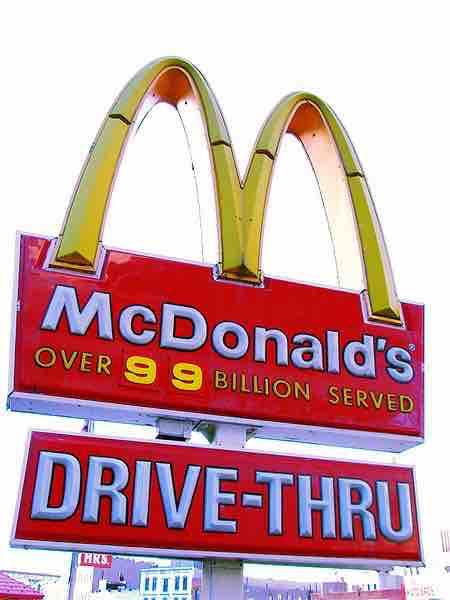"McDonaldization" is a term used by sociologist George Ritzer in his book The McDonaldization of Society (1993) . McDonaldization as described by Ritzer is a reconceptualization of rationalization, or moving from traditional to rational modes of thought, and scientific management. In sociology, rationalization refers to the replacement of traditions, values, and emotions as motivators for behavior in society with rational, calculated ones. Where Max Weber used the model of the bureaucracy to represent the direction of this changing society, Ritzer sees the fast-food restaurant as having become a more representative contemporary paradigm in contemporary societies. In Ritzer's book, McDonald's serves as the case model of this process in the 1990s .

George Ritzer
George Ritzer is a sociologist who studies American patterns of consumption, globalization, metatheory, and modern and postmodern social theory.
Components of McDonaldization
According to Ritzer, McDonaldization is comprised of four main components: efficiency, calculability, predictability, and control. The first one, efficiency, is the optimal method for accomplishing a task. Efficiency in McDonaldization means that every aspect of the organization is geared toward the minimization of time. From a customer perspective, efficiency is achieving the fastest way to get from being hungry to being full.
The second component, calculability, refers to the quantifiable objectives of fast-food chains. McDonaldization developed the notion that quantity equals quality, and that a large amount of product delivered to the customer in a short amount of time is the same as a high quality product . This allows people to quantify how much they're getting versus how much they're paying. Workers in these organizations are judged by how fast they accomplish tasks instead of the quality of work they do. This relates to the idea of availability versus variety - you can get a lot of one thing, but not necessarily the thing you want. Increase in volume does not equate to increase in choice.

McDonald's
The sign at a McDonald's "drive-thru. " The "over 99 billion served" statement illustrates Ritzer's idea of calculability.
Third, predictability is the idea that no matter where a person goes, they will receive the same service and receive the same product every time they interact with the McDonaldized organization. This also applies to the workers in those organizations. Their tasks are highly repetitive, highly routine, and predictable.
Fourth, under control, employees become standardized and replaced by non-human technologies. Lastly, as part of standardization, cultural hybridization occurs. Ritzer argues that as McDonald's enters a country, consumer patterns are unified, and starting with the food chains, local cultures are westernized.
Ritzer also outlines irrationality of rationality as a fifth aspect of McDonaldization. As Ritzer said, "Irrationality means that rational systems are unreasonable systems. By that I mean that they deny the basic humanity, the human reason, of the people who work within or are served by them. " He further states that beyond dehumanization further irrationalities emerge; including the inefficient masses of red tape, over quantification leading to low quality work, unpredictability as employees grow unclear about what they are supposed to do, and the loss of control due to other inadequacies.
Examples
Junk-journalism, defined here as inoffensive and trivial news served up in palatable portions, is an example of Mcdonaldization. Another example could be McUniversities, which features modularized curricula, delivering degrees in a fast-track pick-and-mix fashion to satisfy all tastes. The diminished quality of these products can only be disguised by extensive advertising which constantly repackages them to look new. When we look at schools and classrooms across the world, there is an ever increasing similarity between that of Western classrooms and the rest of the world. This can be considered an example of how Western culture, focused on efficiency of transfer of knowledge, has spread around the rest of the world.
De-McDonaldization
As a response, the process of de-Mcdonaldization offers alternatives to this model of production and organization. Many corporations have been making an effort to deny the kind of rationalization similar to what Ritzer calls McDonaldization. Protests have also been arising in nation-states to protect localized economies and traditional values.